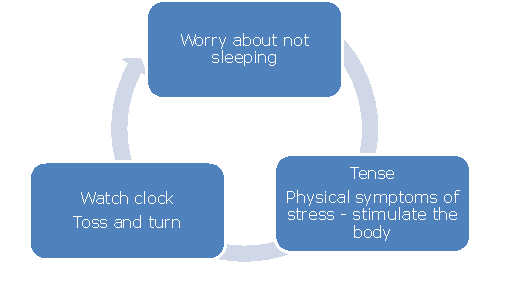Sleep Insomnia Self Help
Self help guide for sleep problems, using effective CBT strategies. Learn how to make positive changes
 There are many reasons for not sleeping well which may include distress, physical discomfort or physical illness.
There are many reasons for not sleeping well which may include distress, physical discomfort or physical illness.
Sleep needs vary. A baby starts life needing 16 hours or so of sleep each day, and the time we need for sleep decreases as we get older, so that adults, and particularly older adults may only need 4-6 hours a night.
People's needs vary, but most people feel they need 7-8 hours, whilst others feel they need more.
Our modern way of living has a big impact on the natural sleeping cycle. Previously, we were much more in tune with nature, going to bed when natural light faded and the day's temperature reduced. This prompted our body to produce melatonin, which makes us sleepy. Artificial light (including from our digital screens) and heating delays the production of melatonin.
Our mental health also has a big impact on our sleep pattern. We might have difficulty getting off to sleep, wake up frequently during the night, or wake early in the morning and not be able to get back to sleep. These all result in our feeling that we haven't slept enough - we feel tired, tense and are likely to worry about not sleeping. This worry can then make it even harder for us to sleep well.

If you have trouble sleeping, there are some things you can do to help yourself get a good restful night. These include making changes in:
- Your environment
- Your behaviour and routine
- Your thinking
Reset your body clock
If you're a night owl and you fall asleep in the early hours of the morning then wake up later in the morning, you can take these steps for 3 weeks to reset your body clock:
- Wake up 2-3 hours earlier than usual and get plenty of outdoor light in the morning
- Eat breakfast as soon as possible
- Have lunch at the same time every day, and eat nothing after 7pm
- Ban caffeine after 3pm
- No naps after 4pm
- Go to bed 2-3 hours earlier than usual and limit light in the evening
- Maintain the same sleep and wake times every day

Change your Environment
Are there any helpful changes you can make?
- Bedroom too light
- Bedroom too hot or too cold - our bedroom needs to be cool
- Bedroom too noisy
- Bed too uncomfortable
- Partner keeping you awake? (snoring, restless etc)
- TV, computer, tablet or mobile in your bedroom
Making changes to our environment so that our bedrooms become a restful place for sleeping. Remove excess light (particularly blue light), make sure the temperature is right, and check the bed and pillow are comfortable. If you cannot reduce the noise, then consider ear-plugs designed for sleep use. Remove TV and device screens from your bedroom, and read from a conventional book rather than an e-book on a back-lit screen.
Change your Behaviour
- Use your choice of relaxation technique before going to bed (whatever works for you)
- Do not go without sleep for a long time if you can help it. Keep to a regular pattern of going to bed and getting up at the same time every day, whether you are tired or not
- Keep bed for sleep and sex. No watching television, browsing the internet or checking your email or social media.
- Get some exercise during the day. Try some regular swimming or walking. Avoid exercise late in the evening.
- Reduce the caffeine (tea, coffee, some soft drinks) in the evening. Try a milky drink instead.
- Don`t drink a lot of alcohol. It may help you fall asleep, but you are more likely to wake up during the night.
- Don`t eat or drink a lot late at night. Try to have your evening meal early rather than late.
- Cooling ourselves e.g. taking a cold shower just before bed helps promote melatonin.
- If you have had a bad night, resist the temptation to sleep the next day which will make it harder to get off to sleep the following night.
- If something is troubling you and there is nothing you can do about it right away, try writing it down before going to bed and then tell yourself to deal with it tomorrow.
- If you cannot sleep, don`t lie there worrying about it. Get up and do something you find relaxing like reading or listening to quiet music. After a while you should feel tired enough to go to bed again.
- Keep a sleep diary for a week. Then you can look back and notice what helps you sleep better and what doesn`t, so you can make positive changes and do more of what helps, and less of what doesn`t. If nothing seemed to help, try something different.
- Speak to your doctor about your medication and how that might be affecting your sleep.
- Avoid clock watching when in bed and put your attention somewhere restful
- Use imagery
- Mindful Breathing
- Relaxation Technique
- BACES: Steps to positive mental health
- Use a sleep aid
Change your Thinking
Worrying about not sleeping will keep you awake! Rather than put your focus of attention on the worrying thoughts, notice that they are just thoughts, then put your attention somewhere restful, use imagery, mindful breathing, or your relaxation technique.
Tell yourself that worrying about it will not help, and that you probably are getting enough, just less than you think you need. Our needs change as we get older.
If you're worrying about a particular problem, write it down, and tell yourself you can sort it in the morning.
Distract yourself by thinking about a random sequence of objects for a few seconds each. E.g. a table, a tree, a saucepan, a flower, a cow, a cloud etc. Or you could think about a few items beginning with the letter "B", then move on through the alphabet.
Download and listen to the Simply Sleep mp3 (below)
SIMPLY SLEEP mp3
Female voice, with music.
36 mins 30s
SIMPLY SLEEP mp3
Male voice, with music.
36 mins 30s
Sleep Self Help - this page as PDF
BACES: Steps to positive mental health
Learn effective skills online -The Decider Skills for Self Help online course.
Self Help Books
Overcoming Insomnia and Sleep Problems: A Self-Help Guide Using Cognitive Behavioral Techniques
An Introduction to Coping with Insomnia and Sleep Problems (Overcoming: Booklet series)
The Effortless Sleep Method: The Incredible New Cure for Insomnia and Chronic Sleep Problems
Say Goodnight to Insomnia: A Drug-free Programme Developed at Harvard Medical School
Electronic sleep aids
Self Help Books
Overcoming Insomnia and Sleep Problems: A Self-Help Guide Using Cognitive Behavioral Techniques
An Introduction to Coping with Insomnia and Sleep Problems (Overcoming: Booklet series)
The Effortless Sleep Method: The Incredible New Cure for Insomnia and Chronic Sleep Problems
Say Goodnight to Insomnia: A Drug-free Programme Developed at Harvard Medical School
Electronic sleep aids





















